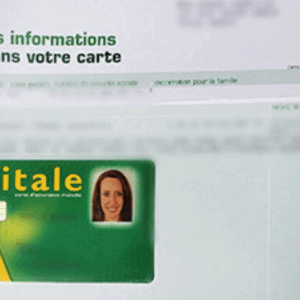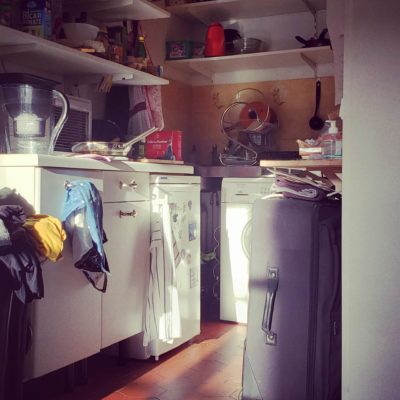How to Find a Médecin Traitant in France

This post is part of my Healthcare in France for Expats series. If you found it helpful, check out my other articles and more to make navigating the system a little easier. Check back often—I’m adding new guides regularly to make French healthcare a little less confusing!
Once you’ve registered with Assurance Maladie, created your Ameli account and requested (and hopefully received) your carte vitale, your next step in your French healthcare journey is selecting a médecin traitant (general practitioner) that will be your main doctor.
A médecin traitant is essentially your primary care doctor in France. In the U.S., you might call them your family doctor or general practitioner. They’re the first point of contact for most of your healthcare needs. Whether you need a routine check-up, a prescription refill, or a referral to a specialist, your médecin traitant is the person who oversees and coordinates your care.
Unlike in some countries where you can directly book with a specialist, the French system is built on what’s called the parcours de soins coordonnés (coordinated care pathway). That means most specialist visits, lab tests, or follow-ups should go through your designated médecin traitant. This ensures your healthcare remains consistent, organized, and tracked in one place.
Registering a médecin traitant isn’t just about having a “family doctor”, there is a very practical, financial and administrative consequences:
Reimbursements: If you don’t have a médecin traitant registered, you’ll only get partially reimbursed for visits. For example, instead of the standard 70% reimbursement from Assurance Maladie, you might only get 30%. Over time, that adds up.
Referrals: Many specialists (cardiologists, dermatologists, gynecologists, etc.) require a referral from your médecin traitant. Without that, you may not be seen, or you may have to pay more out of pocket.
Continuity of care: Having a consistent doctor means your medical history, prescriptions, and follow-ups are all managed in one place. It prevents things from getting lost in the shuffle and helps ensure you get the best possible treatment.
When I first moved to France, I thought finding a doctor would be as simple as walking into a clinic or going onto Doctolib, finding the nearest doctor and making an appointment. I quickly learned that it doesn’t necessarily work that way here. The first few doctors I contacted weren’t taking on new patients and I felt a bit panicked about what to do if I suddenly got sick. Eventually, I found my médecin traitant through a recommendation from a family member, and registering with them was surprisingly straightforward. It was such a weight off my shoulders to know that if anything came up I had someone I could go to and not have to worry about any extra costs.
Table of Contents
What is a Médecin Traitant?
In the French healthcare system, your médecin traitant is the starting point of your medical care. They are usually a general practitioner (médecin généraliste) who manages everyday health concerns like colds, prescriptions, and check-ups, but their role goes far beyond that.
Role in the French healthcare system
Central doctor: Your médecin traitant is the one who refers you to specialists when needed, for example, to a cardiologist for heart concerns, a dermatologist for skin issues, or a gynecologist for ongoing care. This ensures you’re on the parcours de soins coordonnés (coordinated care pathway), which keeps your treatments consistent and properly reimbursed.
Record keeper: Because they see you on a regular basis, they have a complete picture of your medical history, prescriptions, and test results. This continuity makes it less likely that something important will be overlooked.
First point of contact: They’re who you go to first for almost anything health-related. If it’s urgent and they’re not available, you can still go elsewhere — but ideally, they remain your main medical contact.
Difference between having one vs. not having one
With a médecin traitant: You benefit from the full reimbursement rates through Assurance Maladie (usually 70% of the standard consultation fee, with your mutuelle covering the rest). You also get easier access to specialists through referrals, and your care is streamlined.
Without a médecin traitant: You’ll still be seen by doctors, but the system considers you “outside the coordinated pathway.” That means your reimbursement drops significantly (often only 30%), and in some cases, you may face longer waits or higher out-of-pocket costs for specialists. It can also lead to fragmented care, since no single doctor is tracking your overall health.
Choosing and changing your doctor
One of the reassuring parts of the French system is its flexibility. You’re free to choose any general practitioner as your médecin traitant, provided they agree to take you on. You’re also free to change doctors at any time, there’s no penalty or complicated process. If you move, or if you simply find that another doctor is a better fit for your needs (for example, someone who speaks English or has a more compatible communication style), you can update your registration with Assurance Maladie.
Exceptions to the rule
Not all specialists require a referral. Even if you haven’t yet registered with a médecin traitant, you can go directly to:
Gynecologists (for routine check-ups, contraception, pregnancy care).
Ophthalmologists (for vision checks and glasses prescriptions).
Dentists (for regular dental care).
Psychiatrists (if you’re under 26).
Children are generally covered under their parent’s médecin traitant until they’re old enough to choose one themselves, so families don’t need to worry about registering multiple separate doctors right away.
How to Find a Doctor in France
Finding a médecin traitant can feel intimidating at first, especially if you’re new to France and don’t know how the system works. The good news is that there are several ways to track down a doctor, though availability can vary depending on where you live.
Online directories:
Ameli.fr – This is the official Assurance Maladie website. You can search for doctors by location, specialty, and whether they’re part of the public healthcare system (secteur 1 or secteur 2). It’s the most reliable source for up-to-date listings, though the interface is not the most user-friendly for non-French speakers.
Doctolib.fr – By far the most popular booking platform in France. Many doctors, especially in bigger cities, use it for online appointment scheduling. You can filter by specialty, location, and sometimes language. Doctolib also lets you see the next available appointment and book instantly, a lifesaver if you’re not comfortable calling in French. Available on desktop or phone application.
Local recommendations:
Word-of-mouth is one of the most effective ways to find a doctor, especially if you’re looking for someone who speaks English or who is particularly patient with expats.
Ask neighbors, colleagues, or fellow parents at school who they see.
Many expat groups on Facebook or WhatsApp regularly share doctor recommendations, especially in cities like Paris, Lyon, or Nice.
Even your local pharmacist can be a great resource — they often know which doctors in the neighborhood are taking new patients.
Walking in or calling directly:
In smaller towns or suburban areas, not every doctor is listed on Doctolib. Sometimes the best approach is the old-fashioned one:
Call the cabinet médical (doctor’s office) to ask if they’re accepting new patients as a médecin traitant.
You can also stop by in person to check with the receptionist. This approach can feel intimidating with limited French, but even a simple phrase like “Bonjour, acceptez-vous de nouveaux patients comme médecin traitant ?” goes a long way.
Special considerations for expats:
For many expats, the challenge isn’t just finding a doctor — it’s finding one you can communicate with comfortably.
In larger cities, you’ll find international clinics and medical centers where doctors often speak English or other languages. These are especially common in Paris (e.g., American Hospital of Paris, Centre Médical International).
On Doctolib, some doctors mention if they speak English or other languages, but it’s not guaranteed.
If language is a big concern, you can also look into telemedicine platforms like Qare, where English-speaking doctors are available for online consultations.
Possible challenges:
It’s worth knowing that France is currently facing a shortage of general practitioners in many areas, often called déserts médicaux (medical deserts). In big cities, this might mean long wait times for appointments. In rural or suburban areas, it can sometimes mean that local doctors aren’t taking new patients at all. Don’t be discouraged if you hear “non” the first few times you ask. Persistence pays off, and being flexible about location, appointment times, or even trying a nearby town can help. In the meantime, you can still see doctors on a one-off basis or use urgent care services, even if they’re not your official médecin traitant.
How to Register for a Médecin Traitant
Once you’ve found a doctor who agrees to be your médecin traitant, the registration process is pretty straightforward and much less intimidating than it sounds.
1. Make an appointment
The first step is simply booking a consultation with your chosen doctor. During the appointment, you can explain that you’d like to register them as your médecin traitant. In French, you can say:
“Je voudrais vous déclarer comme mon médecin traitant.”
Some doctors may want to meet you first before accepting, especially if they already have a full patient list. This first visit functions as both an introduction and an opportunity to confirm they’re willing to take you on.
My first appointment with the cabinet I had chosen, I selected an appointment for médecine génerale and met with the practitioner on duty, who happened to be a replacement that day. They asked me questions pertaining to my medical history and I had shared with them my medical file that I had brought and translated from home.
2: Fill out the declaration form
The form is called the déclaration de choix du médecin traitant. It includes your basic details (name, birth date, social security number) and your doctor’s information. Usually, the doctor fills it out electronically during your visit.
During my appointment, the doctor was fille out the form and informed me that the office would choose a doctor for me based on my medical history. She filled me in on what she was doing and how she would be submitting the form. She said I would then be able to see the information on my Ameli account.
3: Submission to Assurance Maladie
Most common: Your doctor submits the declaration directly online through their secure portal. This is quick, simple, and you don’t have to do anything afterward, just wait for it to be processed.
Less common (paper form): In rare cases, if the form is done on paper, you may need to mail it yourself to your local CPAM. The address is listed on your Ameli account.
4: Confirmation and timeline
Once the declaration is processed, the registration is usually immediate. You can log into your Ameli.fr account and check the “Mes informations” section, where the name of your médecin traitant should appear. From that point on, your reimbursements will follow the coordinated care pathway.
Good to know
You can change your médecin traitant at any time by repeating the same process with a new doctor.
Each family member needs their own médecin traitant. For children, parents usually declare a pediatrician or family doctor on their behalf.
You’ll still be reimbursed for visits while you’re waiting for the registration to process, the system updates retroactively once the doctor is officially linked to your account.
Costs & Reimbursements for a Visit
Understanding how payments and reimbursements work is one of the trickiest parts of navigating the French healthcare system as an expat. The good news is that once you’ve declared a médecin traitant, it’s fairly straightforward.
When choosing a doctor in France, you’ll often see the terms conventionné secteur 1 or secteur 2. These refer to how the doctor sets their fees in relation to Assurance Maladie:
Secteur 1 doctors follow the official rates set by Assurance Maladie (for example, €26.50 for a GP visit). They don’t add extra fees, and your reimbursement is straightforward, 70% of the base fee, with your mutuelle usually covering the rest. This option is generally the least expensive for patients.
Secteur 2 doctors are also conventionné (meaning they work within the public system), but they are allowed to charge more than the official base rate. The Assurance Maladie reimbursement is still calculated on the base fee (not the higher price you actually pay). Whether you get the extra cost reimbursed depends on your mutuelle, some cover it fully, others only partially.
Non-conventionné, although much rarer, these doctors are outside of the system entirely. Assurance Maladie reimburses very little, and you usually pay much more out of pocket.
For most expats, starting with a secteur 1 doctor is the simplest and most affordable option, but if you prefer a secteur 2 doctor (perhaps for language reasons or availability), it’s worth checking what your mutuelle will cover.
Standard consultation fee
As of 2025, the base fee for a visit to a médecin généraliste (general practitioner) in France is €26.50. This applies whether you’re seeing them for a cold, prescription renewal, or follow-up. If your doctor charges extra (common with secteur 2 doctors, who are allowed to set their own fees), you’ll pay more, but reimbursements are still calculated from that base rate of €26.50.
How reimbursements work:
Assurance Maladie normally reimburses 70% of the base fee, so about €18.55 for a standard consultation.
Ticket modérateur which is the remaining 30% (about €7.95) is usually covered by your mutuelle. If you don’t have a mutuelle, you’ll pay that part yourself out-of-pocket.
Direct reimbursement happens in most cases, the doctor’s office charges you upfront, and Assurance Maladie reimburses you directly to your bank account within a few days. Some offices use the tiers payant system, meaning you don’t pay anything upfront except the small non-refundable part (participation forfaitaire of €1 per visit). For this to happen, your bank account needs to be linked to your Ameli account.
Without a médecin traitant
If you don’t have a médecin traitant registered, the rules change:
Your reimbursement from Assurance Maladie drops to 30% of the base fee instead of 70%.
That means for a €26.50 consultation, you’ll only get €7.95 back from Assurance Maladie, leaving you to cover the rest (even if you have a mutuelle).
Over time, this adds up significantly, especially if you need multiple doctor visits or specialist referrals.
So while technically you can see doctors without registering, financially it doesn’t make sense in the long run.
Specialist fees and reimbursements:
Specialist costs vary depending on the type of doctor and whether you were referred by your médecin traitant:
With referral: Assurance Maladie reimburses 70% of the base fee (e.g., €30 for a cardiologist, ~€50 for a psychiatrist).
Without referral: Reimbursement drops to 30%, and your mutuelle usually won’t cover the difference.
Secteur 2 specialists: Many charge more than the base fee (called dépassements d’honoraires). Assurance Maladie still only reimburses from the base fee, but some mutuelles cover all or part of the extra charges.
There are a few exceptions. As noted earlier, certain specialists (gynecologists, ophthalmologists, pediatricians, psychiatrists under 26, dentists) can be seen directly without a referral and still qualify for the full reimbursement.
Tips to Help When You're Looking for a Médecin Traitant
Finding and registering with a médecin traitant isn’t always quick and easy, especially if you’re freshly arrived and are still learning the ropes of the French healthcare system. Here are a few tips that can help make the transition smoother:
1. Start early
Don’t wait until you’re sick to look for a doctor. In many parts of France, especially larger cities like Paris, Lyon, or Marseille, there are doctor shortages (déserts médicaux). It may take several phone calls or even a few weeks to secure a médecin traitant. Starting the process early gives you peace of mind and ensures you’re covered when you actually need care.
2. Don’t get discouraged
It’s common for doctors to say they aren’t accepting new patients as a médecin traitant. This doesn’t mean you can’t book a one-off appointment with them, just that they can’t commit to managing your care long-term. Keep calling around, ask for recommendations, and try different approaches (Doctolib, Ameli, word-of-mouth). Persistence really does pay off.
3. Be flexible about where and how you get care
GPs vs. clinics: If you can’t find a private GP taking new patients, check out local health centers (maisons de santé or centres de santé). These clinics often have several doctors working together and may have more availability.
Telemedicine: Platforms like Qare, Livi, and Alan allow you to consult with a doctor online, often with English-speaking options. While they might not always serve as your official médecin traitant, they can be a great temporary solution or a backup when you can’t get an in-person appointment.
4. Navigate the language barrier
Not every doctor in France speaks English, and even if they do, medical vocabulary can be tricky. Here are some strategies:
Bring a friend or partner if you need translation support during your first visit.
Check profiles on Doctolib: Some doctors list English or other languages in their profile. But be aware that this may not mean they are as fluid in the language or even speak it. Lower your expectation.
Use simple French phrases: Even something like “Je parle un peu français, est-ce que vous parlez anglais ?” can help.
Apps and prep: Bring a list of your symptoms in French (Google Translate, DeepL, or Linguee are handy for prep work).
5. Keep urgent care options on hand
Until you’re settled with a médecin traitant, it’s smart to have a backup plan. Keep a list of:
The nearest urgent care clinic (Maison Médicale de Garde or SOS Médecins).
Emergency numbers: 15 for SAMU (medical emergencies), 18 for fire brigade, 112 (EU-wide).
Local pharmacies: Pharmacists in France are highly trained and can often advise on minor issues or tell you where to find a doctor.
Finding and registering with a médecin traitant is one of the most important steps you can take to feel secure in the French healthcare system. Not only does it ensure better continuity of care and easier referrals to specialists, but it also protects your wallet by maximizing your reimbursements.
If you’re new to France, it can be tempting to put this task off until you’re sick and in urgent need of a doctor, but that’s often when it’s hardest to find one. Starting your search early will give you peace of mind and save you stress later on.
Every person’s experience is a little different: some find a doctor quickly, while others spend weeks making phone calls before finally getting accepted. I’d love to hear how it went for you! Did you find your doctor easily? Was language a barrier? Do you have tips for others who are still looking? Share in the comments below!


You May Also Like

Everything You Need to Know How to Understand Your Carte Vitale in France
19 November 2025
How to Set Goals in France (& Why French Bureaucracy Forces You To)
8 January 2026